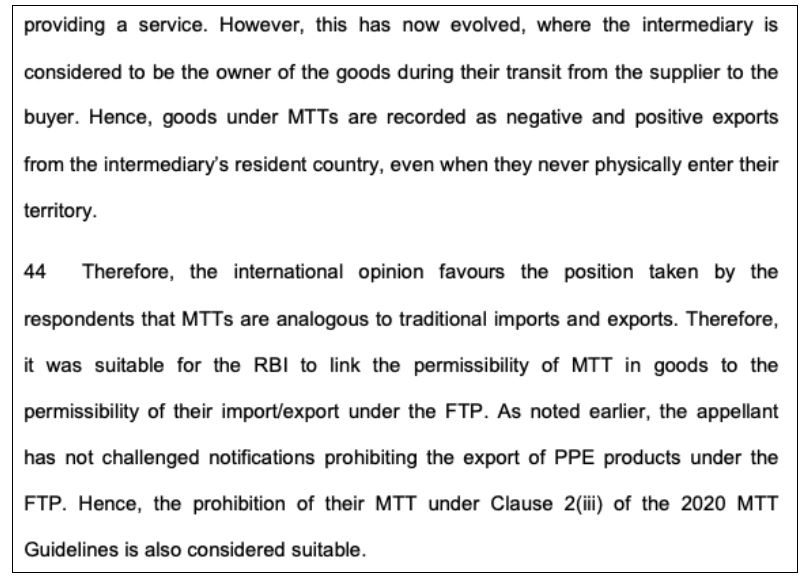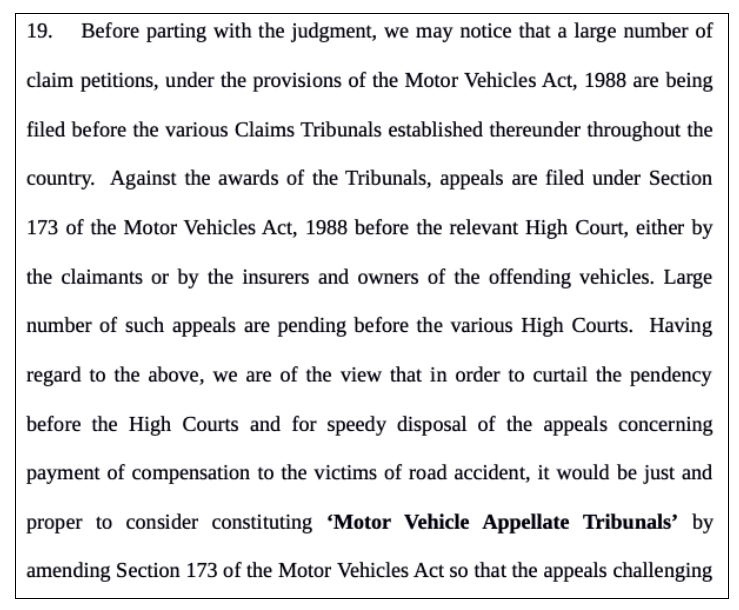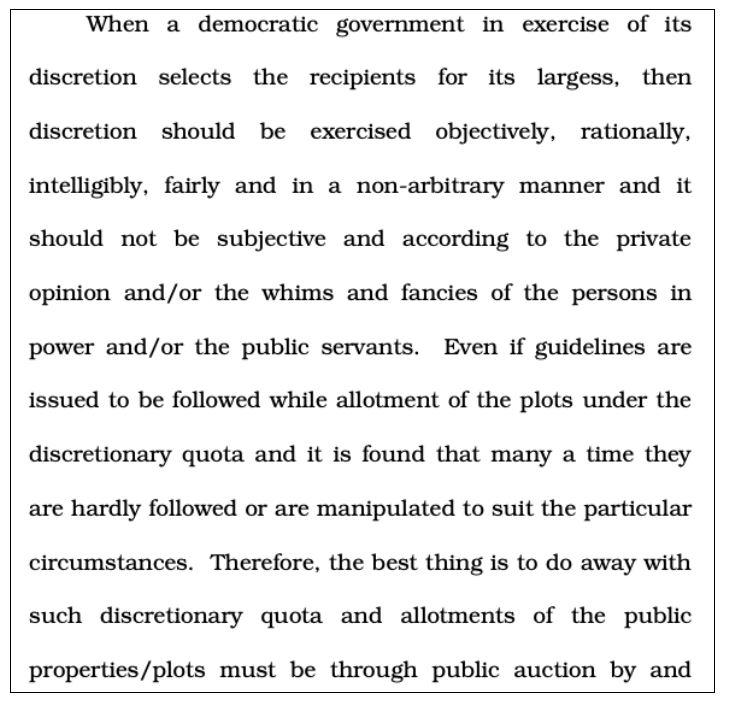In this roundup of court judgements, we look at Constitutional Courts’ remarks & directions about an export ban on PPE kits, need for the constitution of Motor Vehicle Appellate Tribunals in the country, NCPCR estimates of orphaned children due to COVID-19, implications of allotment of government land on the basis of discretionary quota.
Supreme Court: Upholds RBI regulations for an export ban on PPE kits; ‘Well-being of masses over Right to Business of few’.
In the case Akshay N Patel vs. Reserve Bank of India (RBI) and others, the Supreme Court upheld the measures adopted by the RBI to implement the ban imposed by the Union Government on the export of Personal Protective Equipment (PPE) Kits in view of the COVID-19 pandemic.
The apex court was hearing a challenge to Clause 2(iii) of the Revised Guidelines on Merchanting Trade Transactions (MTT) (dated 23 January 2020) issued by the RBI in the exercise of its power under Section 10(4) and 11(1) of the Foreign Exchange Management Act 1994. The petitioner is a businessman engaged in manufacturing and trading of pharmaceutical, skincare and PPE products. The petitioner had obtained a contract to serve as an intermediary between the sale of PPE products by a supplier in China to a buyer in the United States. He was denied a letter of credit to execute the MTT contract for the above transaction, in view of the export ban imposed by the Union Government on PPE kits.
The petitioner claimed that the restrictions amounted to a violation of his fundamental right of freedom to trade and business guaranteed under Article 19(1)(g) of the Constitution of India. Earlier, he had challenged the above provisions in Madhya Pradesh high court, which ruled that that ban of export in respect of KN95 Masks, PPE kits and other products does not amount to a violation of the fundamental right and it is a purely policy matter under the ambit of Government of India.
The bench of Justices DY Chandrachud, Vikram Nath and BV Nagarathna examined the restrictions on the basis of the “test of proportionality” (evolved in earlier precedents) with the following questions:
- Is the measure in furtherance of a legitimate aim?
- Is the measure suitable for achieving such an aim?
- Is the measure necessary for achieving the aim?
- Is the measure adequately balanced with the right of the individual?
The bench observed that the measure by the government & RBI is enacted with a legitimate aim that is of sufficient importance to override a constitutional right of freedom to conduct business. The steps undertaken are also necessary to achieve the objective of ensuring adequate supplies.

The court noted that while the petitioner was an intermediary facilitating the transfer of kits between the USA and China and that the goods were not entering the territory of India, they are still recorded as negative and positive exports from the territory of an intermediary. The bench concluded that the RBI has regulatory powers and has demonstrated a rational nexus in the prohibition of MTTs in respect of PPE products and the public health of Indian citizens.
Therefore, the apex court concluded that the RBI decision was a proportionate measure; and therefore, upheld the RBI regulations for an export ban on PPE kits.
Supreme Court: Recommends constitution of Motor Vehicle Appellate Tribunals in view of large pendency in high courts.
In the case Rasmita Biswal & Ors vs. Divisional Manager, National Insurance Company Ltd & Another, the Supreme Court recommended the constitution of Motor Vehicle Appellate Tribunals in the country by amending Section 173 of the Motor Vehicles Act for hearing appeals challenging the award of a Tribunal.
The apex court was hearing a civil appeal filed challenging the Orissa high court order (dated 07 March 2018), which reduced the compensation payable to family members of the deceased in a motor vehicle accident from Rs. 22,60,000 to Rs. 17,00,000.
The bench of Justice Abdul Nazeer and Justice Krishna Murari recalculated the amount of compensation payable to the appellants as 31,01,000 considering the following:
- The monthly income of the deceased is Rs.15,000/- per month (deceased was 33 years old). The annual salary of the deceased comes to Rs. 1,80,000/- which has to be multiplied by ’16’ which becomes Rs. 28,80,000/-
- 40% of the income of the deceased added towards loss of future prospects which comes to Rs. 11,52,000.
- One-fourth of the income i.e., 10,08,000/- has to be deducted towards the personal expenses of the deceased, as he has left behind three dependants.
- The total amount payable to the claimants towards loss of dependency comes to Rs. 30,24,000/-
- The claimants are entitled to 10% enhancement. Rs.16,500 is awarded towards loss of estate and conventional expenses and Rs. 44,000 is awarded towards the spousal consortium.
The bench also took cognizance of the high pendency of motor accident claims appeals before high courts.

In view of the above, the apex court recommended speedy disposal of appeals concerning payment of compensation to victims of a road accident and to curtail the pendency before the high courts. Pertaining to the constitution and composition of such Appellate Tribunals, the bench recommended the following:
- The various Benches of such an Appellate Tribunal could consist of two Senior District Judges.
- The Benches of the Tribunal can be set up in various regional cities, in addition to the capital city of each State as may be indicated by the relevant High Court to ensure access to justice and avoid pendency.
- For this purpose, appropriate rules governing the procedure of the Appellate Tribunal may also be framed.
9855 Children Orphaned, 132113 Lost Either Parent & 508 Children Abandoned During COVID: NCPCR tells Supreme Court
As per the data uploaded on the Baal Swaraj Portal – COVID care from April 2020 to 7 December 2021, a total of 9,855 children are orphaned, 1,32,113 children have lost either parent and 508 children are abandoned. This aggregate data was presented state-wise for children who have lost either mother or father or both parents after 1 April 2020, irrespective of their reason of death (not only death due to COVID-19).
In compliance with the Supreme Court’s earlier directions with regards to the status of children, the National Commission for Protection of Child Rights (NCPCR) filed an additional affidavit analysing data of children from 19 States/UTs that was available on the Baal Swaraj Portal. About 7,499 letters have been sent to the district authorities for completion of data and removing discrepancies on the portal. In the abovementioned letters, recommendations have been made to the district authorities to link the child and his/her family with the schemes/ benefits for timely financial assistance.
The affidavit also states that as of 8 December 2021, Action-taken Reports have been submitted by only 10 States/ Union Territories. No reports on the actions taken vis-à-vis children orphaned or vulnerable due to COVID-19 has been received from states like Andhra Pradesh, Assam, Dadar & Nagar Haveli, Delhi, Jammu and Kashmir, Ladakh, Mizoram, Maharashtra, and West Bengal.
Supreme Court: Allotment of government land on the basis of discretionary quota inevitably leads to corruption, nepotism, and favouritism.
In the case State of Odisha vs. Pratima Mohanty, the Supreme Court observed that the allotment of public properties on the basis of the discretionary quota has to be done away with.
The apex court was hearing allegations against certain public servants on surreptitiously distributing prime plots in Commercial Complex District Centre, Chandrasekharpur, Bhubaneswar – thereby committing offences under Section 120B IPC and Section 13(2) read with Section 13(1)(d) of Prevention of Corruption Act, 1988. These public servants were employed in crucial positions in the Bhubaneswar Development Authority and in the Housing and Urban Development Department, Government of Odisha.
Upon considering all submissions in the case, the Apex court bench noted that this case represents an abuse of the powers by public servants with mala fide intention. They have hatched a criminal conspiracy to allot public property/plots to family members at a throwaway price causing loss to the public exchequer.
The bench concluded that appropriate action has to be initiated against the officials who are prima facie responsible for the illegality in plot allotments to relatives and/or family members resulting in huge loss to the Bhubaneswar Development Authority (B.D.A.) and the public exchequer.

The bench noted that it is time to do away with the allotment of government largess on the basis of discretionary quota as this inevitably leads to corruption, nepotism, and favouritism. Therefore, the apex court emphasised that all allotments of public properties must be transparent, fair, and non-arbitrary. In cases where public land is allotted to a particular class (underserved class) as per a policy decision, it has to be done in strict accordance with guidelines.
Featured Image: Important Court Decisions


